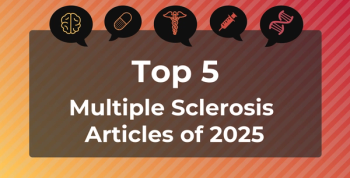
Treatment Approach in MS Center of Excellence
Nancy Ross, PharmD, BCACP, MSCS, CSP describes treatment approach and patient navigation in an MS center of excellence.
Episodes in this series

Neil Minkoff, MD: How do you figure out if the patient should try drug A before they go to drug B or if you’re adamant drug B is right for them?
Nancy Ross, PharmD, BCACP, MSCS, CSP: Because we’re a center of excellence, it’s almost as if we don’t see the patient when they’re first diagnosed. Chances are they’ve been somewhere else. They’ve been to a local neurologist, the emergency department, or somewhere else. And someone along the line has told them, “You probably have multiple sclerosis, and you need to see a specialist.” By the time they get to us, they’ve already gotten their feet wet. If my physician then comes to me and says, “I want this patient on drug B,” then that’s the drug they need. I’m going to push absolutely for coverage of drug B, and we’ll continue to argue and do whatever we can, including appeal letters, second-level appeal letters and peer-to-peers to support our case.
Neil Minkoff, MD: How do you track patients to see how they’re doing with drug B to see if they need to go to drug C? How do you follow that up to provide not just the information necessary for their clinical care, but also for bean counters like me and Maria Lopes so we have to alter our thinking?
Nancy Ross, PharmD, BCACP, MSCS, CSP: I do ask for quite a bit of feedback. I will tell patients that this is a relatively new drug that has been out for 6, 9, or 12 months and we need feedback on how this medicine is affecting them in their daily lives. I tell patients that not every drug is for every person and not every drug is for every person at every stage in their life. Your disease and your symptoms may change. We need to be flexible with that and understand that we need to adjust your therapy accordingly. Although in 1993 we had a take it or leave it option, now, if this drug isn’t right for you, that’s fine. Don’t suffer. Let us know and we will work with you to make sure you can stay compliant on this medicine. I don’t want you at home suffering trying to irk out this medicine when we have other options.
Neil Minkoff, MD: Trying to brazen it out.
Nancy Ross, PharmD, BCACP, MSCS, CSP: Yes, exactly.
Neil Minkoff, MD: When patients are coming in on therapies that would not be your center’s choices, is that being driven by payer coverage, patient choice, or external prescribers? You may not know, but if you have any sense as to what’s driving those decisions, that would help us level set what we’re doing here.
Nancy Ross, PharmD, BCACP, MSCS, CSP: Typically, if a patient is seeing their local neurologist, their local neurologist might not see a huge volume of patients with multiple sclerosis. They’re not going to be as familiar with some of these high-level medications. They’re going to be very familiar with interferons, Copaxone, and even with Tecfidera, dimethyl fumarate, and those kinds of things because they’re a little less complicated. Tysabri, Ocrevus, Kesimpta, and Gilenya are a little more complicated. When Gilenya came out and it had all the cardiac warnings, local neurologists didn’t know what to do with it. They tend to use some of the more traditional agents because they’re more familiar with them. When the patient moves to a specialist, the specialist will say, “Yes, but look at the annualized relapse rates on these medications. We need to move you to something that’s more effective.”
Transcript edited for clarity.
Newsletter
Stay ahead of policy, cost, and value—subscribe to AJMC for expert insights at the intersection of clinical care and health economics.










